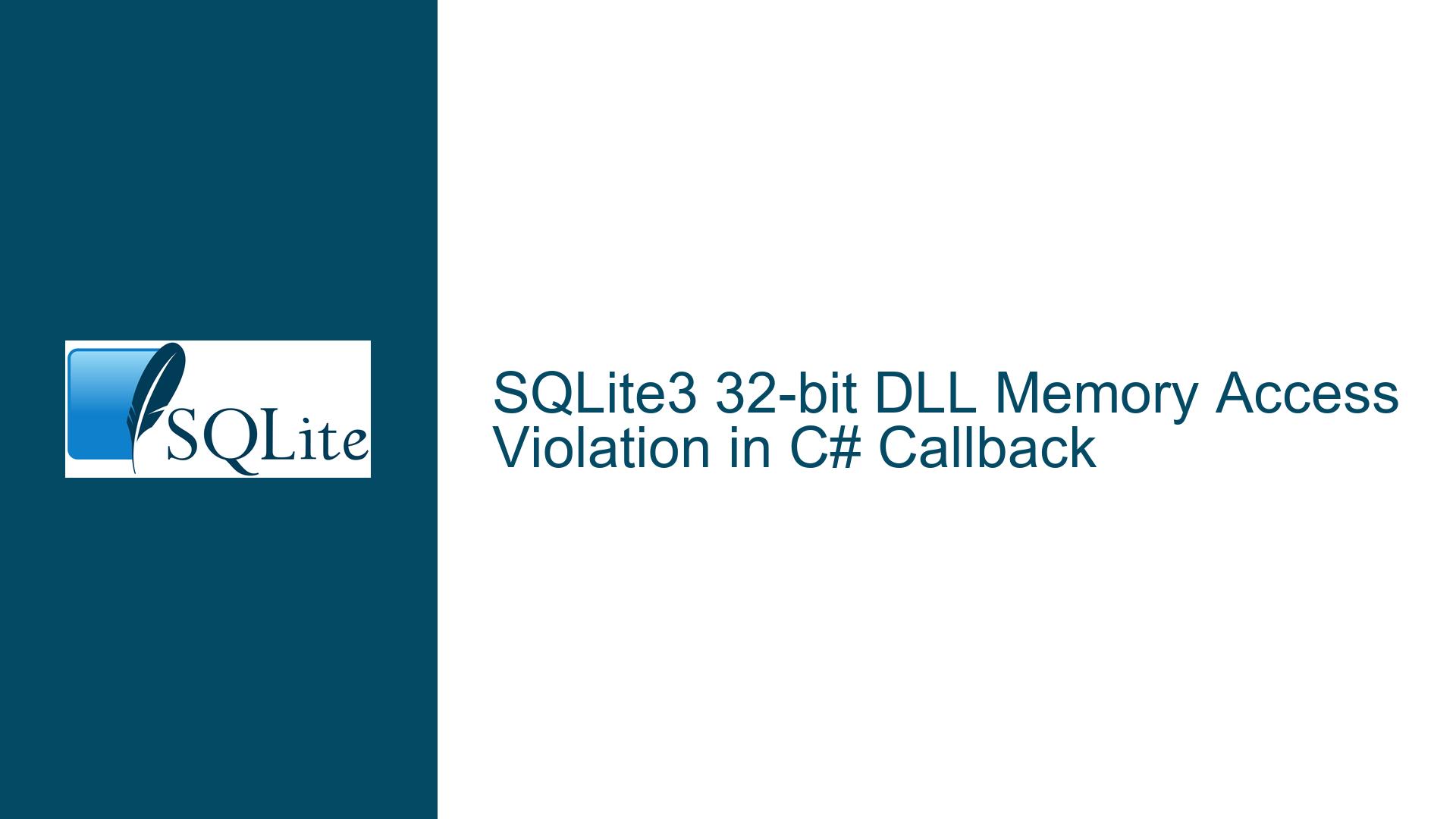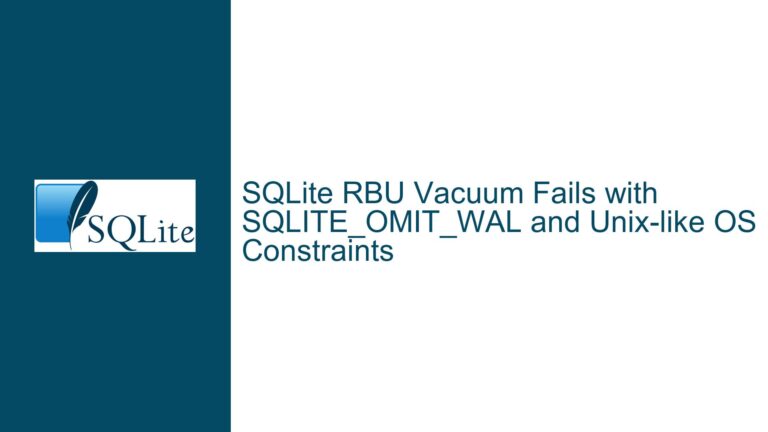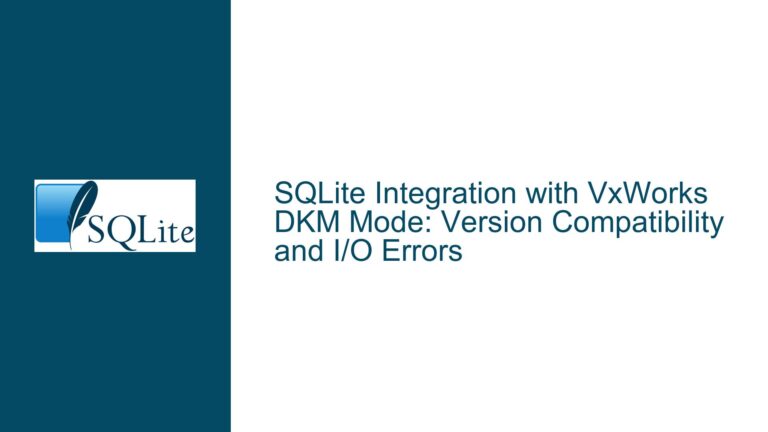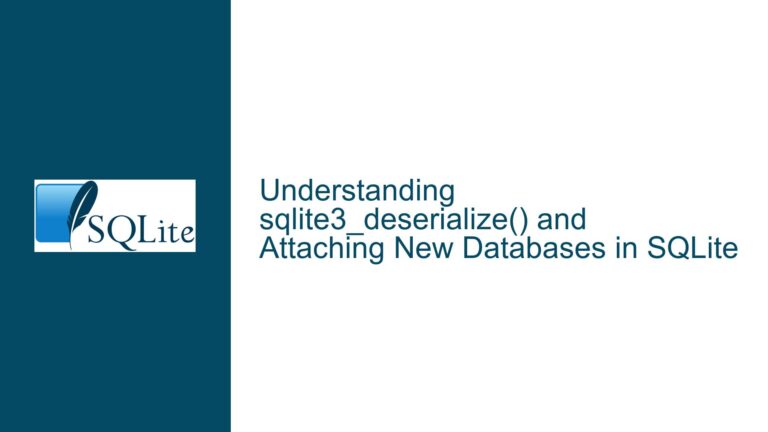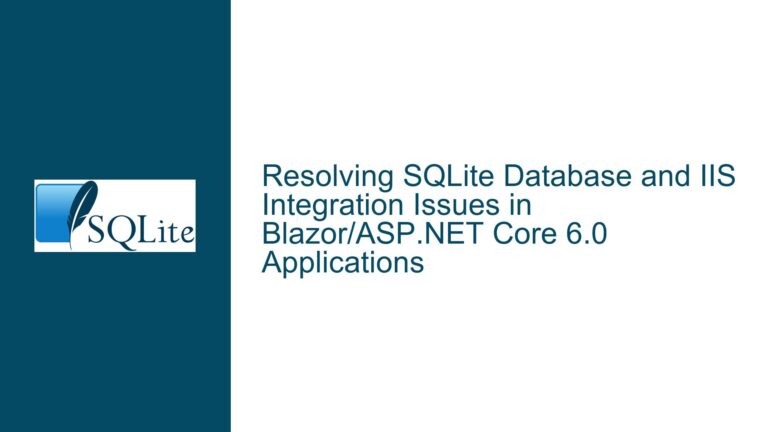SQLite3 32-bit DLL Memory Access Violation in C# Callback
Memory Access Violation in 32-bit SQLite3.DLL During Callback Execution
The core issue revolves around a memory access violation error that occurs when using the 32-bit version of the SQLite3.DLL in a C# application. Specifically, the error manifests as an "Attempted to read or write protected memory" exception during the execution of a callback function within the sqlite3_exec() API. This issue is particularly perplexing because the identical callback code works flawlessly with the 64-bit version of the SQLite3.DLL. The problem is consistent and reproducible, occurring during the 4th callback invocation, regardless of the number of rows or columns in the SQL query result.
The sqlite3_exec() function is a convenience API in SQLite that allows executing SQL statements and processing the results through a callback mechanism. The callback function is invoked for each row of the result set, and it is here that the memory access violation occurs. The issue is isolated to the 32-bit version of the SQLite3.DLL, suggesting a potential problem with memory management or calling conventions when interfacing between the managed C# environment and the unmanaged 32-bit SQLite3.DLL.
The error message "Attempted to read or write protected memory" is a strong indicator of a memory corruption issue, often caused by incorrect memory handling or mismatched calling conventions between managed and unmanaged code. This is particularly relevant in scenarios where data is passed between different execution realms, such as between the .NET Common Language Runtime (CLR) and native code.
Incorrect Calling Convention in C# Callback Function
The primary cause of the memory access violation is the incorrect specification of the calling convention in the C# callback function. The SQLite3.DLL uses the cdecl (C declaration) calling convention for its callback functions. However, the initial C# implementation of the callback did not explicitly specify the calling convention, leading to a mismatch between the expected and actual calling conventions when the callback is invoked by the 32-bit SQLite3.DLL.
In the context of interop between managed and unmanaged code, the calling convention dictates how function parameters are passed and how the stack is managed during function calls. The cdecl calling convention, used by SQLite, requires that the caller cleans up the stack after the function call. If the calling convention is not correctly specified in the C# code, the stack may not be properly managed, leading to memory corruption and access violations.
The issue is more pronounced in the 32-bit environment due to differences in how the .NET CLR handles interop with 32-bit and 64-bit native code. In 64-bit environments, the default calling convention may align more closely with the cdecl convention, which could explain why the issue does not manifest with the 64-bit SQLite3.DLL. However, in the 32-bit environment, the mismatch in calling conventions becomes critical, leading to the observed memory access violation.
Another contributing factor is the use of the sqlite3_exec() function, which is a high-level API that abstracts away much of the complexity of executing SQL statements and processing results. While this abstraction is convenient, it also introduces additional layers of complexity when interfacing with managed code, particularly when callbacks are involved. The sqlite3_exec() function is well-tested and widely used, but its interaction with managed code through interop layers can introduce subtle issues, especially when calling conventions are not correctly specified.
Correcting the Calling Convention and Ensuring Proper Interop
The solution to the memory access violation issue lies in correctly specifying the cdecl calling convention in the C# callback function. This can be achieved by using the [UnmanagedFunctionPointer(CallingConvention.Cdecl)] attribute on the callback delegate. This attribute informs the .NET runtime that the callback function should use the cdecl calling convention, ensuring that the stack is managed correctly when the callback is invoked by the 32-bit SQLite3.DLL.
Here is the corrected C# callback function definition:
[UnmanagedFunctionPointer(CallingConvention.Cdecl)]
internal delegate int Callback(
IntPtr p,
int n,
[In][MarshalAs(UnmanagedType.LPArray, ArraySubType = UnmanagedType.LPStr, SizeParamIndex = 1)] string[] names,
[In][MarshalAs(UnmanagedType.LPArray, ArraySubType = UnmanagedType.LPStr, SizeParamIndex = 1)] string[] values
);
In this corrected implementation, the [UnmanagedFunctionPointer(CallingConvention.Cdecl)] attribute ensures that the callback function uses the cdecl calling convention, matching the convention used by the SQLite3.DLL. Additionally, the [In] and [MarshalAs] attributes are used to correctly marshal the string arrays passed to the callback function, ensuring that the data is correctly interpreted by the managed code.
To further ensure proper interop between the managed C# code and the unmanaged SQLite3.DLL, it is important to verify that the project settings are correctly configured. Specifically, the "Platform Target" setting in the C# project should be set to "x86" when using the 32-bit SQLite3.DLL. This ensures that the application runs in a 32-bit environment, aligning with the architecture of the SQLite3.DLL.
Here are the steps to configure the project settings:
- Open the C# project in Visual Studio.
- Right-click on the project in the Solution Explorer and select "Properties".
- Navigate to the "Build" tab.
- Set the "Platform target" to "x86".
- Ensure that the "Prefer 32-bit" option is enabled if applicable.
By correctly specifying the calling convention and configuring the project settings, the memory access violation issue can be resolved, allowing the callback function to work correctly with the 32-bit SQLite3.DLL.
In addition to the above steps, it is also recommended to thoroughly test the application after making these changes to ensure that the issue is fully resolved. This includes testing with various SQL queries and result sets to verify that the callback function is invoked correctly and that no memory access violations occur.
For developers who continue to encounter issues, an alternative approach is to avoid using the sqlite3_exec() function altogether and instead use the lower-level sqlite3_prepare(), sqlite3_step(), and sqlite3_finalize() functions. These functions provide more control over the execution of SQL statements and the processing of results, potentially avoiding some of the complexities associated with callbacks and interop.
Here is an example of how to use these lower-level functions in C#:
using System;
using System.Runtime.InteropServices;
class Program
{
[DllImport("sqlite3", CallingConvention = CallingConvention.Cdecl)]
private static extern int sqlite3_prepare_v2(IntPtr db, string sql, int nByte, out IntPtr stmt, out IntPtr pzTail);
[DllImport("sqlite3", CallingConvention = CallingConvention.Cdecl)]
private static extern int sqlite3_step(IntPtr stmt);
[DllImport("sqlite3", CallingConvention = CallingConvention.Cdecl)]
private static extern int sqlite3_finalize(IntPtr stmt);
[DllImport("sqlite3", CallingConvention = CallingConvention.Cdecl)]
private static extern IntPtr sqlite3_column_text(IntPtr stmt, int iCol);
static void Main(string[] args)
{
IntPtr db = // Open SQLite database connection
string sql = "SELECT * FROM my_table";
IntPtr stmt;
IntPtr pzTail;
int rc = sqlite3_prepare_v2(db, sql, -1, out stmt, out pzTail);
if (rc != 0)
{
// Handle error
}
while (sqlite3_step(stmt) == 100 /* SQLITE_ROW */)
{
int colCount = // Get column count
for (int i = 0; i < colCount; i++)
{
IntPtr ptr = sqlite3_column_text(stmt, i);
string value = Marshal.PtrToStringAnsi(ptr);
// Process column value
}
}
sqlite3_finalize(stmt);
}
}
In this example, the sqlite3_prepare_v2() function is used to prepare the SQL statement, sqlite3_step() is used to execute the statement and retrieve each row of the result set, and sqlite3_finalize() is used to clean up the statement object. This approach provides more control over the execution process and avoids the need for a callback function, potentially reducing the risk of memory access violations.
In conclusion, the memory access violation issue with the 32-bit SQLite3.DLL in a C# application is caused by an incorrect calling convention in the callback function. By correctly specifying the cdecl calling convention and ensuring proper project configuration, the issue can be resolved. Additionally, using lower-level SQLite functions can provide an alternative approach that avoids the complexities of callbacks and interop.
